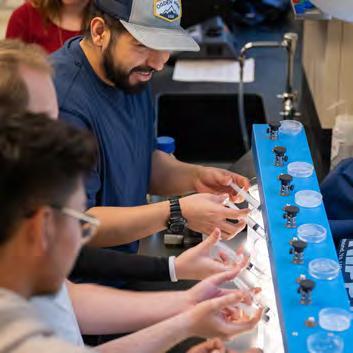FLORIDA GULF COAST UNIVERSITY







“I am incredibly thankful for this internship opportunity that helped me grow my skills in my journey to become a broadcast journalist. The internship and my class have shaped my experience at FGCU. I cannot emphasize how much I’ve changed since the start of the semester— academically and personally! I’m happy I can develop my best career self through a wonderful program at FGCU that fosters growth and mentorship.
Samantha Romero B.A. Journalism



“Work-based learning has been an amazing experience — it has allowed me to gain a wealth of knowledge in my field of study and make important connections with organizations and other individuals in the field at the same time.
Jonathan Wukitsch B.S. Software Engineering

Increase in job offers after completing an internship according to the National Association of College & Employers (NACE).

Internships are work-based learning experiences related to a student’s career path, in which students apply academic coursework and develop critical skills in a professional environment under the supervision of an experienced professional. With intentional learning goals, mentorship, and evaluation, internships enhance the knowledge gained in the classroom and prepare students to transition from college to the workplace through real-world experience.
What are the foundational qualifications of a high-quality internship?
At FGCU, we consider the following the critical components of work-based learning:
} Provide clear learning objectives related to the
} Provide student-interns with clear guidelines regarding student’s professional goals and academic coursework internship expectations, as well as organization rules,
} Engage student-interns in authentic tasks considered policies, and culture meaningful to the organization to encourage
} Ensure a clean, safe, and comfortable environment that practical application of academic coursework and skills includes resources, equipment, and facilities necessary development in a professional setting to support learning goals
} Provide clear direction, mentorship, and supervision
} Compensate student-interns fairly and accordingly by an experienced professional in the field in which } For information on unpaid internships, please refer the intern will be working, who is accessible, to the Fair Labor Standards Act Fact Sheet #71 supportive, and able to provide routine feedback
As an employer, your role in the internship process is incredibly important! When you hire an intern, you become a co-educator in the student’s career development. The following are some of the benefits students experience as part of a well-designed internship opportunity:
} Academic, personal, and professional development
} More job offers, higher starting salaries, and a shorter
} Feedback to identify strengths and areas of improvement
} Development of skills, knowledge, and abilities to build job search career readiness
} Exposure to the professional world of work
} An easier transition from college to career
} Competitive edge in the future job search
} Expanded network with more connections in
} Increased understanding of the field professional fields
} Exploration of intended career path prior to graduation
} Opportunity to apply skills they’ve learned in the
} Solid letters of recommendation
} And much more! classroom in a real-world experience
Work-based learning experiences may come with different names depending on the nature of the career field or industry! You may recognize them as:
} Internship } Clinicals
} Cooperative Program (or Co-op)
} Apprenticeship
} Practicum } Fellowship
} Field Experience
} Research Assistant
An internship should be a mutually beneficial relationship! This means that along with creating a learning opportunity for students, your intern should also be contributing to your vision, mission, and daily operations. The following are some examples of benefits that bringing on an intern can have for YOU!
Additional Personnel/Student Contributions
} New and innovative ideas, perspectives, feedback
} Insights on skills and current trends in technology
} Valuable workforce support with smaller financial impact
} More time for existing staff to pursue more advanced projects
} Assistance with project work, whether already underway or launching
Recruitment & Training
} Opportunity to guide and evaluate potential future employees
} Development of a talent pipeline and maintenance of succession planning
} Reduction in recruitment costs as previous interns assimilate faster into their new roles and have shorter learning curves than external hires
} Ability to base permanent hire decisions on observation and evaluation of candidate’s quality of work, skills, work ethic, and fit before making a full-time position offer
Professional Development
} Interns provide an opportunity for staff to develop management skills, including communicating expectations, providing feedback, verifying hours, and more
Community Connection
} Enhanced reputation in the local community as expertise is contributed to FGCU along with a commitment to keep talent local
} Increased connections on FGCU campus, allowing organizations to attract additional qualified full-time and internship candidates
} Increased visibility and brand awareness among a large student body
} Recognition by peer organizations as a talent development hub
} Ability to give back to the community by teaching the next generation workforce
Retention of Talent
} Conversion of students to full-time employees
} Reduced turnover rates
} Students may participate in paid or unpaid internships. However, to secure competitive candidates and increase equity to access, it is strongly encouraged to pay interns. Paid internship compensation rates vary depending on the field, but generally start above a minimum wage.
} For information on unpaid internships, please refer to the Fair Labor Standards Act Fact Sheet #71.
Compensation ranges are based on the experience level of the candidate as well as academic qualifications. Some considerations:
} Sophomores: Low Range – Student candidates at this level are just beginning to develop their skillsets and may work a more limited schedule.
} Junior-Seniors: Mid-Range - Depending on experience level, prior internships, and degree progress, students at this level may be ready for more comprehensive tasks and projects.
} 2nd Semester Seniors: These students generally earn the higher competitive rate of internship compensation in the field. Additionally, offers for full-time employment at the end of the internships (and upon graduation) are more common for these candidates!
} Most interns anticipate working 10–15-hours a week or more, but this can vary based on availability and degree requirements.
} It is ideal to collaboratively create an internship schedule that aligns with student course schedules.
} Students may work half days, full days, or have the flexibility to complete reporting or projects outside of structured hours as needed.
} Typical block course schedules for students at FGCU are as follows:
} Class or Work: Monday/Wednesday/Friday
} Class or Work: Tuesday/Thursday
Duration:
Typical internships occur over the course of the academic semester for 12-16 weeks.
NOTE: Students participating in summer internships may work 12 weeks but will often work more consistently during this brief period to gain additional experience or insight into the role as a full-time candidate.
For students wishing to secure academic credit for these internships, it is helpful to align your internship opportunities with the semester schedule, shown below. However, students can complete internships at any time during their education or between undergraduate and graduate programs.
Cooperative Learning (Co Op)May be up to a year in length -
If you wish to offer to extend a current intern’s experience, the above schedule is also useful for check points or evaluation periods to decide in collaboration with the student if an extension is ideal!
Course offerings vary by program! Some programs allow for students to receive academic credit outside of traditional recruitment periods in shorter or more flexible courses known as “A” or “B” sessions, which begin at week 8 in the academic semester. Not all programs can offer this opportunity to students in their major.
Providing students with a competitive hourly salary helps to secure future full-time hires that are effective in your organization and their role!

32% MORE LIKELY
for internal interns to be retained after one year compared to new hires who lack internship experience according to the National Association of College & Employers (NACE).
Let’s talk about intern compensation! Compensating interns is the best way you can support them in their learning experience and professional development. Unpaid internships are less common in many fields. In addition, providing unpaid internships places barriers between you and good candidates and brings potential challenges to students.
For many students, participating in an internship means they will need to reduce hours at another part- or full-time job, leave that role, and/or adjust their academic schedules. In addition, students may have many expenses that go along with getting a college-level education, such as tuition, housing, books, etc. Some internship opportunities require increased transportation costs, specific professional attire, or other additional expenses. For some students, the financial hardship that comes with replacing paid part-time work with unpaid part-time work is not possible.
For employers, many unpaid internships go unfilled leaving a strain on the existing workforce.
Please considering supporting students with compensated internship experiences, but if that is not possible at this time, the Fair Labor Standards Act for Unpaid Internships is an excellent resource for making sure an unpaid internship follows legal guidelines. Please review the following reference from the Department of Labor under the Fair Labor Standards Act .
Generally, start at a minimum wage, but can vary greatly by field or industry.
Hourly wage (most common) - This compensation structure allows employers to manage the rate of compensation according to individual qualifications. It is ideal for students as well, as they have a better understanding of the time commitment for the work as well as their own financial planning.
Stipends - Stipends are a one-time payment, either at the beginning or the end of the internship experience. These are typical in research-based internships or internships in competitive fields. Students may also be eligible for scholarships as well as other financial incentives or benefits when utilizing a stipend compensation model.
Housing - Housing allowances are ideally included when the candidate must secure housing in a different region and may be included in compensation packages as an additional payment, or employers may also have housing arrangements for a cohort of interns beginning in an internship program. This is more common for summer internship programs that require candidates to relocate temporarily to participate in the program
Reimbursements - Students may be reimbursed by the company for related expenses to mitigate the cost of
participation in the internship, or for the related cost of tuition if seeking academic credit. This may also be a form of compensation available to students at the end of their successful internship.
Professional Organization Membership - As an additional bonus, the host organization may also provide students with a membership or student membership to a professional organization related to the field as a part of the internship. This allows students to begin building their professional networks in their industry as well as learn more about the industry trends without additional expense to the individual during their internship experience.
Trainings/Conferences - The host organization may also provide students with the opportunity to participate in professional trainings and certifications while in the internship. The host organization can reimburse students or pay the registration costs upfront as a part of their overall operating budget while including this as a benefit in the internship compensation package.
Many students have limited (if any) funds available to attend conferences so this is an immense benefit to students, particularly students interested in graduate or post-graduate degree programs where conferences are significant in their preparation for the field.
Scholarships are a common incentive for students to both apply for and secure internships with a specific organization.
Private scholarships: May be designated for a specific candidate, distributed by the organization directly to the individual, or through the Registrar’s Office. Private scholarships are not tax deductible for the organization, or the individual receiving them.
Foundation scholarships: Specific to one university, may be specialized to a specific degree, major, student organization, or more general criteria (economic need, GPA requirements). These scholarships may not specify candidates based on the following protected information:
} Gender
} Age
} Race
} Ethnicity
To speak with a representative about creating an FGCU scholarship to benefit students interns at your organization, please speak with our scholarship expert by contacting advancement@fgcu.edu or (239) 590-1067 or by visiting fgcu.edu/advancement

40.1% of students surveyed cited the need to work a paid job as an obstacle to completing an internship according to the National Association of College & Employers (NACE).

An internship is considered “academic” when the student intern enrolls in a course concurrently with their internship experience. A non-academic internship is completed without a concurrent course enrollment.
At FGCU, a student may have varying options when it comes to earning (or not earning) course credit, so it is important that employers avoid promising a student academic credit. This can only be determined by a student’s degree program, academic advisor, internship coordinator, and personal circumstances such as financial aid and degree progress.
An FGCU student internship may fall into one of the following categories, which vary by major:
} Required: Many academic programs require the completion of an internship and the corresponding major course to earn a degree. Some examples include: Communication, Theatre, Healthcare, Education, etc.
} Restricted Elective: Some academic programs give students the option to choose an internship course from a list of program-related courses as part of their degree. Some examples include: Entrepreneurship, Psychology, Business, etc.
} Free Elective: Students who do not have an academic
Internship courses have much in common with traditional FGCU courses, including tuition cost per credit hour. It is important to remember that a student must actually pay to earn credit, so an hourly wage or a stipend may be helpful in paying those costs.
In addition, an internship course may be completed in an online format and will include academic assignments to be completed by the student. These assignments may vary depending on program and course but will generally include written reflections, presentations, and career-related activities such as resume building and mock interviews. However, there may also be assignments that encourage employer/supervisor interaction and experiences, which will require your accessibility and participation. A few examples of these activities include:
} Learning Outcomes: Students are encouraged to meet with their supervisor at the beginning of their internship to discuss the learning goals of the experience, as well as the activities that a student will engage in to meet them. This experience should result in collaborative goal-setting and clear expectations for all parties.
internship requirement or a restricted election option are highly encouraged to take an internship course as a free elective if needed. This means that a student can use an internship course to reach the minimum 120 credits to graduate if their degree requirements do not reach that total once completed.
To enroll in an internship course, a student will need to secure an internship and gain approval to register from their designated internship coordinator or academic advisor. If your student intern wishes to pursue course credit, please refer them to their academic college or the Office of Internships & Cooperative Programs (icp@fgcu.edu) to learn about the process.
} Evaluations & Feedback: A supervisor should be prepared to provide routine and constructive feedback throughout the entire internship experience. In addition, a student may bring an FGCU-created evaluation form to their supervisor several times throughout the semester to document progress, strengths, and areas of improvement. This assignment is usually graded, so your participation is both appreciated and necessary for student success.
} Verification of Hours: All internship courses include a specific hours requirement, meaning a student must complete all required hours and have them verified by their supervisor in order to pass the course. The required number may vary depending on a students’ degree program and credit hour enrollment, so be sure to discuss this with your student intern. At the end of the semester, you will be asked to verify your intern’s hours, most likely through an easy link from FGCU’s Eagle Career Network, which will be sent directly to your email.
FGCU uses the Career Competencies from the National Association of Colleges & Employers as the foundation for career readiness and transferable skills development. We encourage you to be our co-educators in helping students develop them by creating opportunities to engage in internship activities! These eight competencies include:
} Career & Self-Development: Proactively develop oneself and one’s career through continual personal and professional learning, awareness of one’s strengths and weaknesses, navigation of career opportunities, and networking to build relationships within and without one’s organization.
} Communication: Clearly and effectively exchange information, ideas, facts, wand perspectives with persons inside and outside of an organization.
} Critical Thinking: Identify and respond to needs based upon an understanding of situational context and logical analysis of relevant information.
} Equity & Inclusion: Demonstrate the awareness, attitude, knowledge, and skills required to equitably engage and include people from different local and global cultures. Engage in anti-racist practices that actively challenge the systems, structures, and policies of racism.
} Leadership: Recognize and capitalize on personal and team strengths to achieve organizational goals.
} Professionalism: Knowing work environments differ greatly, understand and demonstrate effective work habits, and act in the interest of the larger community and workplace.
} Teamwork: Build and maintain collaborative relationships to work effectively toward common goals, while appreciating diverse viewpoints and shared responsibilities.
} Technology: Understand and leverage technologies ethically to enhance efficiencies, complete tasks, and accomplish goals.
*Definitions and icons are directly from NACE.
FGCU is currently offering FGCU Digital Badges, a skill-badging project that offers micro-credentials to help students acquire in-demand skills and apply existing academic skills in the workplace. FGCU Faculty and staff have been and will continue to work with industry partners (like you!) to identify skill needs and develop innovative co-curricular badge requirements that develop and assess those skills. The goal is to increase the career readiness of FGCU graduates and the Southwest Florida workforce.
These micro-credentials represent mastery of a specific competency. When a student earns a badge, it will be represented through a digital badge in an electronic form that is sharable on job sites and searchable on apps such as LinkedIn. Each badge contains detailed information beyond what a self-reported resume or a traditional transcript would show.
FGCU’s badging program offers digital badges in three categories:
} Industry Specific:
These will offer knowledge and skills needed for success in a particular career area - an example would be the medical device industry badge created in partnership with Arthrex!
CONTINUING G EDUCATION & SKILLS S ACADEMY Y
} The Workforce Skills Academy:
This will help FGCU students, alumni and community members respond to workplace change throughout their careers with badges that focus on emerging skill needs.
} Transferable Skills:
These will focus on general skills that are crucial for success across all employment sectors - things like communication, critical thinking, leadership, or teamwork.
Deciding to host an intern within your organization is a big decision. It requires proper planning and laying the foundation for a high quality, mutually beneficial working experience. Below you will find guiding questions to help you determine if creating an internship is right for you at this time.
Building The Foundation: Questions to consider!
} How will the intern fit into your organization’s goals and culture?
} What do you have to teach? (Think: talent, expertise, skillsets, experiences)
} Do you have a project(s) that needs to be completed and would be mutually beneficial for both your company and an intern?
} How many hours of meaningful work will you be able to provide to an intern?

} Are you prepared to provide a safe and supportive learning environment for a student to grow professionally?
} Is there a mentor for the intern to work with who will be available, supportive, and accessible?
} Do you have an employee that would benefit from serving as a supervisor?
} Would your organization benefit from creating a pipeline to recruit and retain talent?


Determined your goal for creating an internship opportunity?
Identified areas of your organization that could benefit from an additional student perspective or voice?
Established learning outcomes and goals that are structured into the experience?
Determined internship tasks that correspond to established learning outcomes and goals?
Created a structured plan for internship progression?
Assigned a supervisor who is an experienced professional in the intern’s field?
Created an onboarding/training program for new interns?
Developed an internship cycle and schedule, including timelines, meetings, and evaluations?
Developed a comprehensive job description for advertising the opening?
The first step to recruiting at FGCU is to register your employer profile on Eagle Career Network (ECN), FGCU’s student/ employer career management system that reaches the entire student body. ECN is our virtual career hub, where you can showcase your company, post jobs and internship openings, sign up for career events, and be the first to know about any upcoming recruitment opportunities.
Once you are set up in ECN, you will be on FGCU Career Development Services mailing list. This means that you will never miss out on an opportunity to register for a career fair, information session, mock interview day, or any of the many other available options for getting your brand and openings in front of our students. Get started at fgcu.edu/eaglenetworks today!
Now that you’ve done some planning, you’re ready to recruit! Components of successful internship descriptions include:
} Position Title: Create a position title that includes language describing the nature of the job. For example, “Social Media Marketing Intern” or “Management Trainee Intern” is preferred over simply “Intern”.
} Company Overview: Include a brief overview of your company, including information about products and services, mission/vision, values, relevant history, etc. A jobseeker will use this information to make a preliminary decision as to whether they would like to work for your company.
} Job/Internship Summary: Include a brief overview of the open position being recruited and its purpose, primary function, and fit into the company’s efforts as a whole. Think of this as the soundbite – what would this student say to answer the question “What do you do?”.
} Job Duties: Include a bulleted list of specific job duties. Dive deeper into the essential tasks of the position and details of any projects and responsibilities. In the case of internships, these should directly correlate to the learning goals of the experience. Think of it like the skill-focused bullet points of a resume to inform your candidates of the skills they will need to use!
} Required Qualifications: List out any requirements the candidate will need to be hired and successfully perform the job duties.
} Preferred Qualifications: Include any additional skills or qualifications that are desired, but not required. Examples may include level of education, field of study, certain types of experience, foreign language skills, etc. (depending on the required qualifications).
} Additional Information: Include any information that will be important for a jobseeker to know, such as closing date, compensation, hours, schedule, location, travel, working conditions, contact information, etc.
} How to Apply: Include thorough and clear information on how to apply, as well as website links, application components (resume, cover letter, writing sample, letters of recommendation, etc.), and specific names and contact information for the appointed hiring contact.
In addition, be sure to:
} Introduce your company’s brand!
} Set clear expectations from the beginning.
} Use language to intentionally attract the right job/ internship seeker. This may include translating the internal job description to appropriate candidateattracting language and enthusiasm.
} Consider “experience” to include more than just work (service, research, clubs, leadership, projects, coursework).
} Balance realistic and idealistic by clarifying what is required vs desired.
} Proofread for clarity, grammar, and spelling errors!

So you’ve hired an intern and are ready to get started! The following internship components can set both you and your intern up for a productive and an impactful experience. Include these best practices to help your program run smoothly!
You intern is coming into a new work environment and would benefit from a comprehensive orientation, which should be held on their first day. You can help them to feel welcome by preparing for their arrival: ordering business cards, setting up their workspace, creating a schedule, and gifting them company swag.
This may be your intern’s first professional experience, so planning for a detailed orientation is best. Below is a recommended list of items that should be reviewed with the intern on their first day (and consider making a handbook)!
} Describe the Organization’s History:
} Where did it begin?
} How has the organization changed?
} What are the organization’s future goals?
} Explain the Organizational Structure:
} Provide a copy of your organizational chart.
} Explain how the team/departmental groupings were created.
} Take time to explain the specific reporting structure for the team the intern works on.
} Introduction to Key Team Members:
} Who should they know, and what is their role?
} What is the management style of the office?
} Who should the intern go to for questions?
} Workplace Tour:
} Where will they be working?
} Are there other areas they will be using? (Restrooms, break rooms?)
} Are there areas that are off-limits?
} Explain protocol and use of break rooms (including refrigerators, microwave, communal coffee pots, etc.).
} Schedule:
} Start and end times?
} Guidelines for breaks?
} Incorporating class schedules?
} Holiday/special hours?
} Attire/Dress Code/Uniforms:
} Is there a dress code for the office?
} Is a name tag provided/required?
} Are there safety requirements?
} Point of Contact:
} Who do they contact and how if they are going to be absent or there is an emergency?
} Who do they contact when in need of supplies?
} Technology Requirements:
} Familiarize the student with any work accounts or programs they will be using, and provide training resources.
} Detail any policies around using technology, printing, or using work phones for personal business.
} Provide initial (and ongoing) training on mail, telephone, email, etc. systems that will be utilized for work.
} Laws & Security:
} What local, state and/or federal guidelines or law apply to the intern’s work?
} By what safety regulations must the intern abide?
} What are the processes for safety or well-being incidents?
} Learning Goals and Outcomes:
} Create and/or review 3-5 learning outcomes with the intern to ensure they know the expected learning outcomes of the internship.
} Celebrate their first day!

Develop learning goals with your Intern to identify outcomes and desired experiences. They should be SMART: Specific, measurable, attainable, realistic, and time-bound!
To ensure your intern is fully engaged in the learning experience and that their time is spent productively, collaborate with them in creating these goals. Learning goals may relate to:
} Job Skills:
Concrete skills the intern hopes to obtain or build, such as learning to follow or perform appropriate procedures, utilize special equipment/technology, and execute specific methods or job-related tasks.
} Transferable Skills:
Skills and competencies relevant to any job, as well as professionalism. These may include self-confidence, working effectively with others, professional etiquette, networking, time management, organization, and decision-making.
} Career Field/Industry Knowledge: New information regarding the company, industry, occupation, or job duties.
Detail Your Supervision Style & Expectations:
} How much access to you does the intern have? (Weekly meetings are a great place to start!)
} What is your preferred communication style?
} How do you expect your intern to communicate with you?
} Will you be reviewing completed work?
} Is there a procedure you want to follow?
} What periodic forms or reports do you want the intern to complete?
} What tasks can be completed without your approval?

Interns will look to their supervisors for guidance in navigating their transition to the professional world. Meet with the intern regularly. Make sure to reinforce positive attitudes, and encourage the intern to keep a portfolio of work throughout the experience. This will help the intern reflect when the internship has been completed and will provide a sense of accomplishment and professional growth.
Feedback is provided to the student intern throughout the internship, including at least a mid-semester evaluation and a final evaluation. The evaluations give the intern the opportunity to receive feedback regarding their strengths and areas that need growth. If the student is taking an FGCU internship course, they may bring you a form to complete. However, you are welcomed and encouraged to evaluate the student’s work according to the standards and expectations of your organization, field and industry. In addition, be sure to include feedback on the intern’s professionalism, quality of work, and ability to take and follow direction. If you are new to providing feedback, here is a sample structure you can try following to see how it works for you:
} The First Evaluation
When: 1-3 weeks after orientation, onboarding and training is complete
Goal: Ensure everyone’s initial expectations are being met
} The Second Evaluation
When: Mid-point of the internship
Goal: Assess progress made towards agreed upon learning goals and determine if additional resources are necessary to complete assignments. Provide constructive feedback on areas of professional growth
} The Final Evaluation
When: Last week of the internship
Goal: Both Supervisor and intern can reflect on the experience, celebrate successes, and assess professional growth, as well as discuss constructively areas of improvement for both the intern professionally and the internship program
It is helpful if your evaluation schedule aligns with a student’s academic semester schedule. Below are some recommended timeframes to help guide you:
Fall Semester (Mid-August through early December)
} Mid-semester: October
} Final evaluation: End of November
Spring Semester (Mid-January through early May)
} Mid-semester: End of February
} Final evaluation: End of April
Summer Semester
} Summer A semester (Mid-May to end of June)
} Mid-semester: Early June
} Final evaluation: End of June
} Summer B semester (End of June – Early August)
} Mid-semester: Mid-July
} Final evaluation: Early August
} Summer C semester (Mid-May to End of July)
} Mid-semester: Mid-June
} Final evaluation: End of July

Student interns are exploring and learning their new } Provide opportunities to role play situations a field, so professional development can be a highly professional in your field may encounter. impactful way to enhance their internship experience. } Take the intern to any local professional development Meeting professionals to expand their network, sessions/trainings or trade shows. providing opportunities to try out new areas, and } Set-up intra-organizational job shadow opportunities sharing your experience along with that of others are all to provide a full picture into your organization. additional benefits to the intern. Consider: } Schedule informational interviews with your peers and
} Inviting your intern to shadow you and other organizational leaders during meetings, presentations, conference calls, sales pitches, etc.

mentors to provide a deeper look into career paths and advancement opportunities in your career field or industry. } Sponsor student membership in your field’s professional organizations.
“In my internship, I was a Student Teacher at Allen Park Elementary School in (Fort Myers) two days/ week for 12 weeks, in a Grade 3 classroom. To prepare for each week, I wrote and conducted a few lesson plans. I assisted the classroom teacher with anything she needed and acted as her shadow, observing her while she completed everyday teacher duties. I was able to attend planning meetings and observe other teachers in different grades/subject areas. Throughout the internship, I learned and experienced firsthand the importance of developing relationships with students, catering to their needs, and fostering their passions! Because of this internship, I have grown professionally and have begun preparing myself for my career after graduation in May 2022!
Danielle Miller B.A. Elementary Education
As the internship starts to come to an end, it is important to provide closure to the experience. Here are a few things to keep in mind:
} Complete any processes required by your organization (HR notification, exit interviews, payroll, key return, etc.).
} Provide final evaluations/feedback (strengths, areas of improvement) on the intern’s work and contributions.
} If you haven’t already, discuss your intern’s next steps in their career and offer opportunities, advice, connections, and words of wisdom if comfortable.
} Assist the intern in transitioning their workload to others if needed.
} Provide a formal job offer if hoping to hire the intern full-time.
} Celebrate your intern’s hard work and achievements!